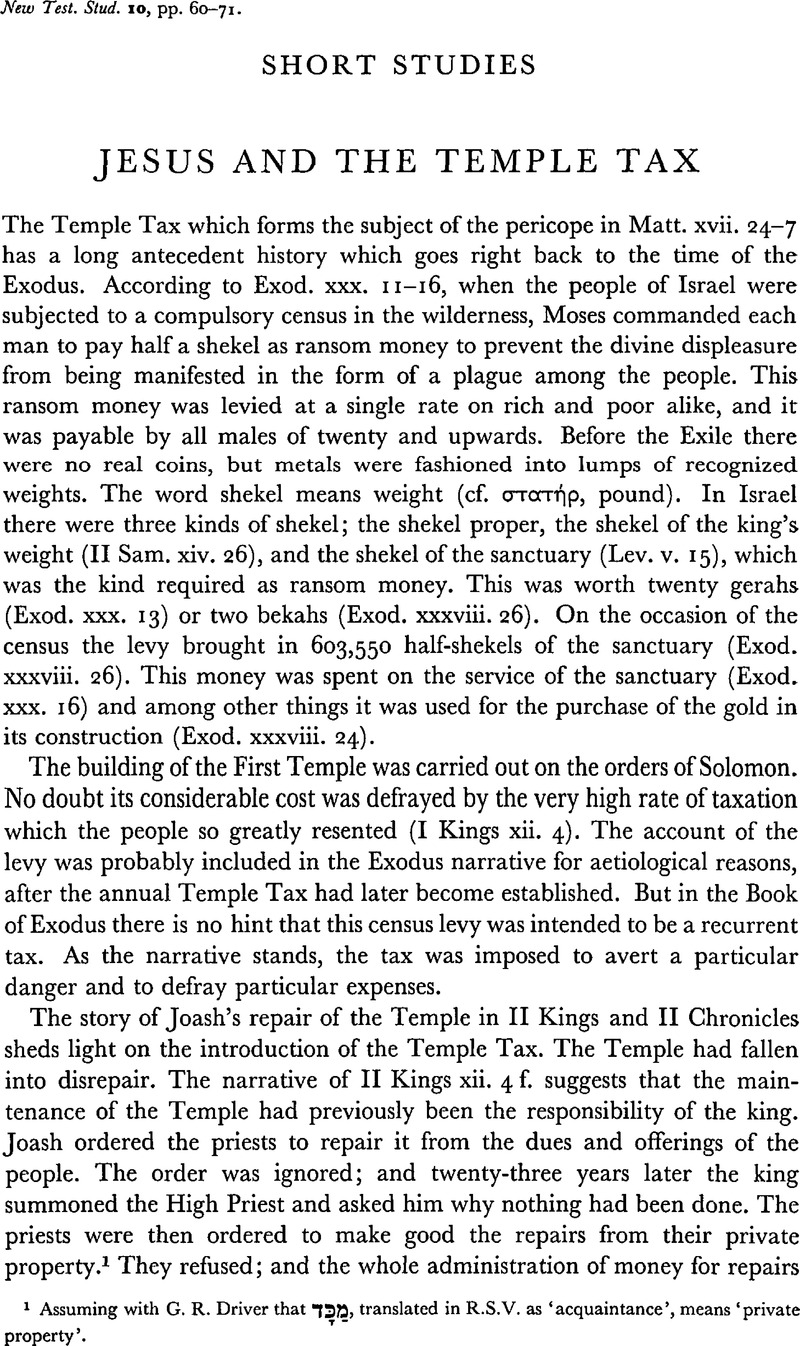Article contents
Jesus and the Temple Tax
Published online by Cambridge University Press: 05 February 2009
Abstract

- Type
- Short Studies
- Information
- Copyright
- Copyright © Cambridge University Press 1964
References
page 60 note 1 Assuming with G. R. Driver that ![]() , translated in R.S.V. as ‘acquaintance’, means ‘private property’.
, translated in R.S.V. as ‘acquaintance’, means ‘private property’.
page 61 note 1 Lods, A., however, suggested that one-third of a Persian shekel may have been equivalent to half a Jewish shekel (The Prophets and the Rise of Judaism (E.T., London, 1927), p. 313, n. I).Google Scholar
page 61 note 2 Ostrakon no. 8.
page 61 note 3 At the fall of the Jewish Temple gold lost half its value on the Syrian market (Josephus, Jewish War, vi, 6, 1).
page 62 note 1 The Mishnah (Oxford, 1933), p. 152.Google Scholar
page 62 note 2 Life and Times of Jesus Messiah (E.T., London, 1887), II, 112.Google Scholar
page 62 note 3 Danby notes that this is a Persian silver coin, not the daric worth 16 shekels in Shek. ii. 1.
page 62 note 4 That is, double shekels.
page 63 note 1 Madden, F. W., Coins of the Jews (London, 1881), p. 16.Google Scholar
page 63 note 2 Op. cit. p. 290.Google Scholar
page 63 note 3 Op. cit. ibid.
page 63 note 4 Op. cit. pp. 293 ff.Google Scholar
page 63 note 5 Streeter pointed out that the tale may bear marks of use in the Antiochene or Damascene churches, as only in these towns was a stater worth exactly two didrachms (The Four Gospels (London, 1924), p. 504Google Scholar).
page 64 note 1 Mattingly, H., Coins of the Roman Empire in the British Museum (London, 1936), III, 15, no. 88 (pl. 4.7); p. 17, no. 98 (not illus.); p. 19, no. 105 (pl. 5.7).Google Scholar
page 64 note 2 Op. cit. p. xlviii.Google Scholar
page 64 note 3 Op. cit.i bid.
page 64 note 4 Suetonius, II, 366.
page 65 note 1 The Origins of the Gospel according to St Matthew (Oxford, 1946), p. 41.Google Scholar
page 65 note 2 Op. cit. ibid.
page 66 note 1 Op. cit. ibid.
page 66 note 2 Herodotus, III, 41 f.
page 67 note 1 Cf. my article, ‘Sulpicius Severus and Titus' Council of War’, Historia, xi (1962), pp. 156 f.Google Scholar
page 67 note 2 Cf. Luke xxiv. 53; Acts iii. 1, etc.
page 68 note 1 Even the sceptical Bultmann writes: ‘This is a problem of the Church, for which it seeks advice from Jesus, in this case perhaps by using a dominical saying handed down in the tradition’ (The History of the Synoptic Tradition (E.T. Oxford, 1963), p. 35).Google Scholar
page 68 note 2 ‘Megillat Ta'anit and Jewish History’, J.Q.R. n.s. x (1919/1920), 24 f.Google Scholar
page 69 note 1 For this reason Moore's, G. F. description of the scholia as a ‘foundation of sand’ is unfair (Judaism (Cambridge, Mass., 1930), III, 46).Google Scholar
page 69 note 2 Smiths2 Dictionary of the Bible, III, 1569 (s.o. ‘Tribute’).
page 70 note 1 In this matter the Sadducees could not only point to the absence of a demand for an annual Temple Tax in scripture but also to positive evidence that the cost of the Daily Offering could be defrayed in other ways. According to II Chron. xxxi. 3 Hezekiah himself provided for daily sacrifice. Ezra vi. 9; vii. 17 ff. suggest that the Persian king paid for it. According to II Macc. iii. 3. Seleucus met its cost. According to the LXX, Syr. and Vulg. texts of Ezra xlv. 17; xlvi. 13 f., the prince is obliged to offer the daily sacrifice. Finkelstein, L. suggests that the M.T. reading ‘thou shalt offer’ in Ezra xlvi. 13 f. is the result of Pharisaic susceptibilities in this matter (The Pharisees (Philadelphia, 1946), II, 683Google Scholar).
page 70 note 2 ‘Purchased from the funds of this treasury, the daily sacrifice became not only nominally but in reality the public offering of the whole people to their God. To the plebeian who could rarely afford to give his own sacrifice to the Temple, this became an important point’ (Finkelstein, L., op. cit. I, 282).Google Scholar
page 70 note 3 J. M. Allegro has published a fragment from Qumran which he believes shows that the Essene attitude towards the Temple Tax was the same as that of Jesus (‘An Unpublished Fragment of Essene Halakhah (4Q Ordinances)’, J.S.S. VI (1961), 71–3Google Scholar). Col. ii. ll. 6 f. read as follows: ‘Concerning […] money of Valuations that a man gives as a ransom for his soul: half a [shekel]. Only once shall he give it during his life-time, the shekel is twenty gerahs according to the [shekel of the Sanctuary].’ If Allegro's interpretation of the passage is correct, the Essenes confused the Temple Tax with the Vow of Valuation (Lev. xvvii. 1–8), and paid the Tax only once in a lifetime. Matt. xvii. 24–7 however does not suggest that Jesus was prepared to pay the Tax once only, and (if Allegro's interpretation can stand) Jesus' view must have diverged not only from those of the Pharisees and Sadducees, but also from that of the Essenes.
- 2
- Cited by


